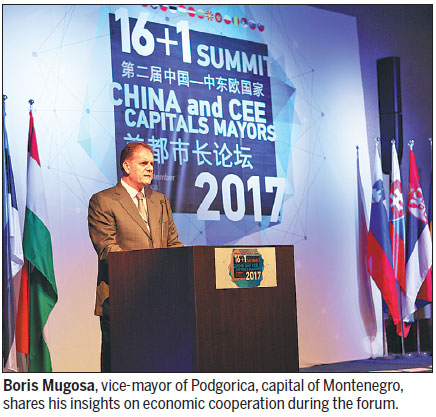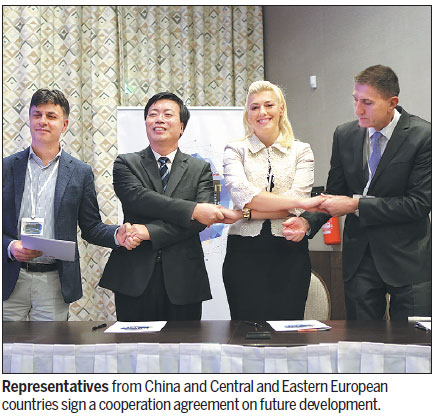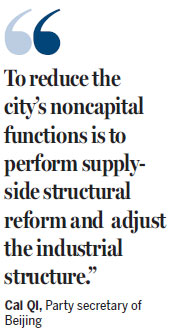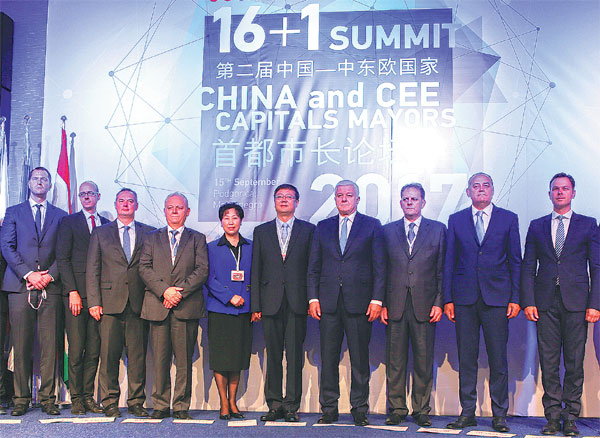Character changes enable city to play its part in development
New commission helps Beijing fulfill capital functions, enter new stage
The mayors of the capital cities of China and Central and Eastern European countries exchanged their understandings of green cities and the role of local governments in cultivating a supportive business environment for companies at a forum held in Podgorica, the capital of Montenegro, on Sept 15.
They explored the characteristics and advantages of their own cities, and discussed the issues of energy structure, infrastructure, environmental protection and energy usage.
Beijing has currently entered a new stage of development featuring the recovery of its environment, noncapital function redistribution and industrial upgrading, Chen Jining, deputy Party chief of Beijing told the participants at the 2017 China-CEE Capitals Mayors Forum.
|
Mayors from China and Central and Eastern European countries discuss key economic and cultural issues at the 2017 China-CEE Capitals Mayors Forum. Photos Provided to China Daily |


Chen said that Beijing is reducing its noncapital functions, upgrading its industrial structure, strengthening the efficiency of its institutions and public infrastructure, while fostering low-carbon development.
On July 28 last year, the Beijing Municipal Commission of City Management was established as the main governmental body for management of the city.
It is charged with environmental protection, energy conservation, waste disposal, underground pipelines, safety in any emergencies, and the smooth everyday running of the city.
In May, the Belt and Road Forum for International Cooperation was hosted in Beijing, and the commission initiated a package of measures to prepare the city for the event.
It performed environmental recovery in more than 10,000 key sites in the Beijing urban area and planted more than 7 million square meters of flowers and trees. It also organized 55,000 sets of lighting equipment and set up 13,000 street flags.
To ensure Beijing's Chang'an Avenue conveys its intended grandeur, the facades of the buildings were renovated, and landscaping, lighting equipment, advertising boards, and traffic barriers were installed along its length.
According to the commission, by the end of 2016, more than 1,000 small alleys in Beijing's urban districts had been given a makeover. In the past three years, they have continued to spruce up 2,435 major streets.
During the first half of 2017, Beijing residents witnessed a citywide campaign to remove unauthorized modifications to residential buildings, a malady that began in the 1980s.

Some of the unauthorized modifications involved transforming the street-front apartments into commercial premises occupied by the businesses, such as real estate agents and shops.
Besides the safety hazards created by such transformations, the large number of unplanned shops also resulted in traffic congestion and the generation of garbage.
By August, a total of 38.34 million square meters of illegal construction were removed in the capital, with urban management officers dealing with 103 unauthorized modifications each day on average.
Another move to improve the quality of life in the city is the bid to mitigate the severe air pollution that has plagued it.
Tough new measures have been adopted, including suspending construction during the winter heating season and compulsory measures on enterprises to cut their emissions of airborne pollutants.
By the end of the year, the concentration of PM2.5 particules with a diameter of less than 2.5 microns should meet the requirement of being lower than 60 micrograms per cubic meter on average, according to the city's Bureau of Environmental Protection.
Beijing is also implementing a plan to relieve it of its noncapital functions. It has restricted manufacturing, wholesale and retail operations in the downtown area, while supporting the expansion of the financial industry, cultural, sports and entertainment industries, as well as the science and technology service industry.
"To reduce the city's noncapital functions is to perform supply-side structural reform and adjust the industrial structure.
"Through that, we can improve the quality of life for residents in the capital and relieve the pressure on the environment. In so doing, the city will be better able to perform its function as the capital," said Cai Qi, Party chief of Beijing.
(China Daily 09/30/2017 page9)















